Stories > Guardians of the Forest
Guardians of the Forest
A Vietnamese non-governmental organisation (NGO) is dedicated to protecting the country’s native wildlife, especially the much-threatened pangolins.
BY SANDHYA MAHADEVAN
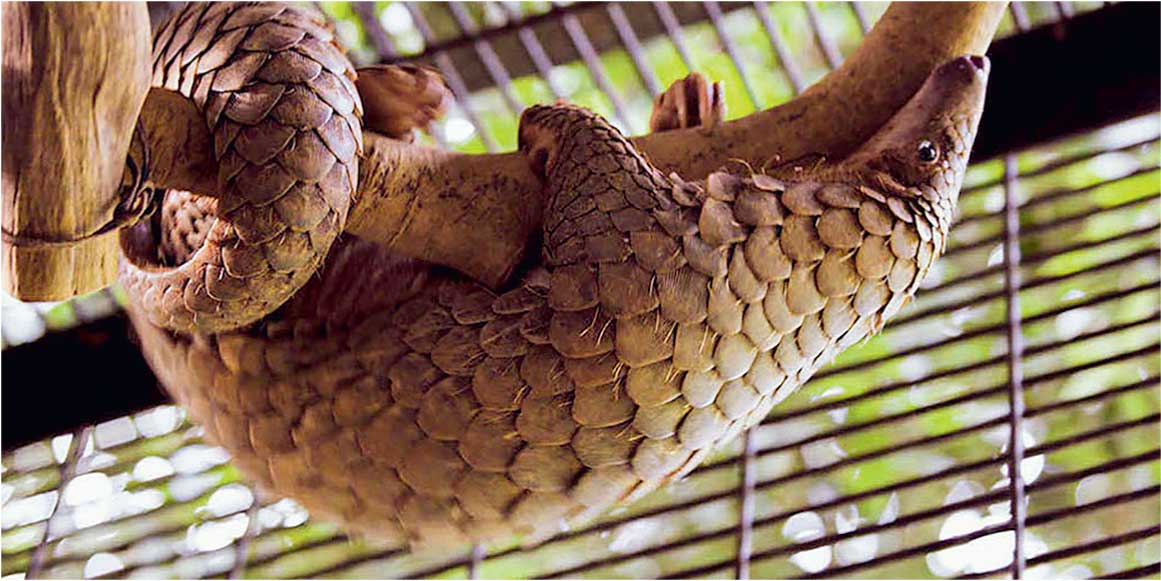
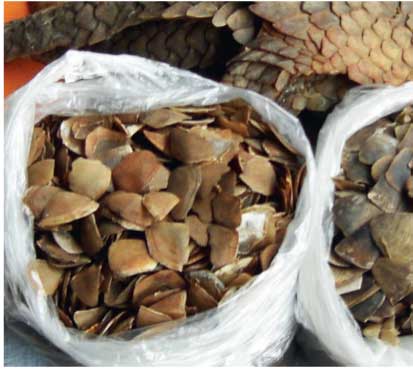
Pangolins have been a prized catch in the illegal wildlife trade market, but a recent ban on the import of wildlife and its products offers hope to conservationists. Inset photo of pangolin scales provided by Traffic, a UK-based NGO that fights illegal trade of wildlife and plants.
he reptilian-appearing pangolin is the only mammal species in the world with true scales. It is also one of the most trafficked mammals around the globe. Just in the past decade alone, over one million of them have been slaughtered for the personal benefit of human beings.
The scales of the pangolin protect them from predators in the wild – they lock in a high concentration of keratin, and are known to be hardy enough to even repel the fangs of a lion. Unfortunately, these properties have also made them a soughtafter ingredient in traditional Chinese medicine as well as African folk medicines.
At the same time, pangolin meat is considered a delicacy in China, Thailand, Cambodia and Vietnam, with its consumption believed to aid kidney function and boost virility in men. Drinking pangolin wine, as well as its blood, is purported to promote healing. Although there is no scientific proof behind these claims, pangolins are poached and sold at a high price to traditional medicine halls and restaurants in Southeast Asia and Africa.
Numbers from the World Wildlife Fund show that 195,000 pangolins were trafficked in 2019 for their scales alone. That same year in April, Singapore made the biggest ever single seizure of pangolin scales en route to Vietnam from Nigeria – 26 tonnes worth an estimated US$77 million. With restaurants charging as much as US$500 to US$600 per kilogramme of pangolin meat – their scales fetching anywhere from US$700 to US$1,000 – the poaching of pangolins is an easy source of income for many of the economically deprived in Vietnam.
This is a practice that non-profits and wildlife conservationists, such as Save Vietnam’s Wildlife (SVW), have been fighting against for many years.
BREAKING BELIEFS AND EDUCATING
“Consuming pangolin meat and scales has existed as part of Vietnamese culture for a long time,” explains Thai Van Nguyen, founder of SVW. Eight different species of pangolins can be found in Africa and Asia. With a maximum reproduction rate of only one offspring per year, all run the risk of extinction. Of the species native to Asia, the Philippine, Sunda and Chinese pangolins are critically endangered.
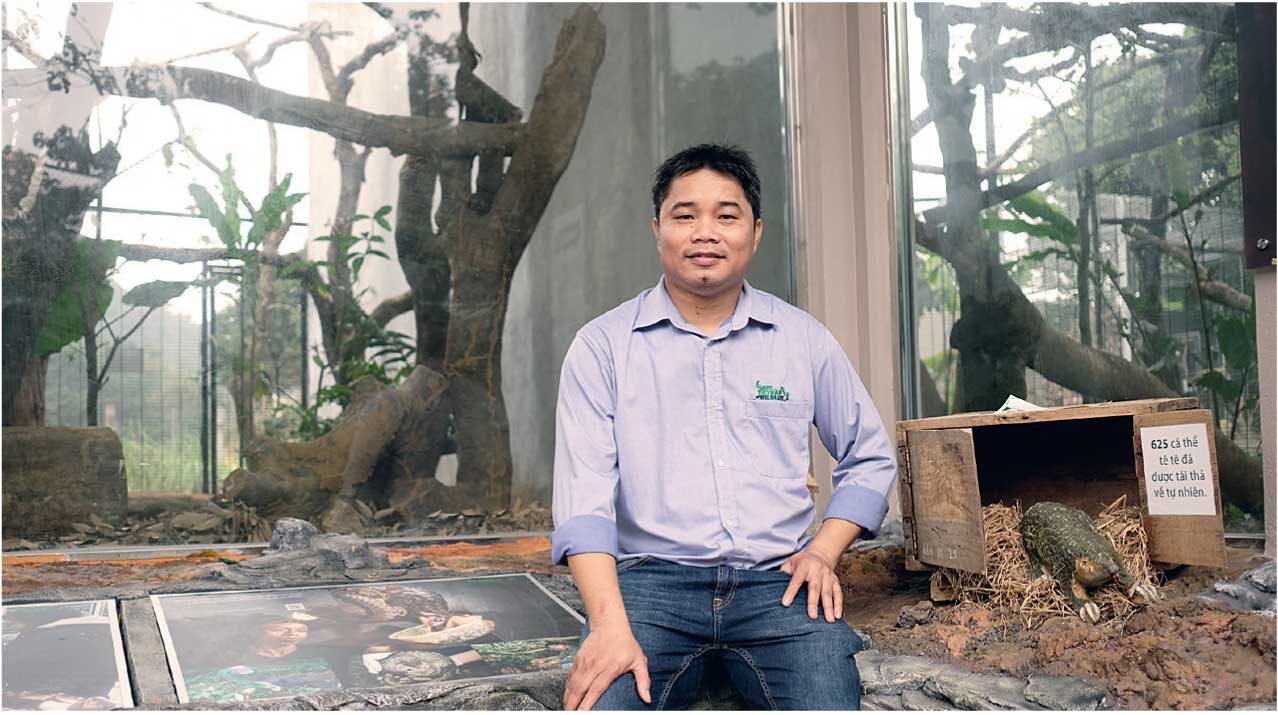
Thai Van Nguyen founded the non-profit Save Vietnam’s Wildlife (SVW) specifically to protect the indigenous and endangered pangolin species from poachers.
“OUR WORK IS NOWHERE NEAR OVER. WITH STRICTER LAWS, MORE CROSS-BORDER CO-OPERATION TO STOP TRANSNATIONAL TRAFFICKING, AS WELL AS GREATER AWARENESS, THERE CAN BE A SAFER WORLD FOR THESE SCALY ANTEATERS,” SAYS THAI VAN NGYUEN.
For Thai, pangolins are not just another wildlife species. Having grown up close to a forested area that abounded with the mammal, he has fond memories of having watched them at close range. “When I was seven or eight years old, I saw the Chinese pangolins with my own eyes,” he recalls. “But in the past 10 to 15 years, they have almost vanished in the wild in Vietnam.”
This childhood memory of these benign creatures and the possibility that they would completely disappear from the forests of his home country – Vietnam is home to both the Chinese and Sunda pangolins – prompted Thai to become a ranger and pangolin captive manager at the Carnivore and Pangolin Conservation Programme (CPCP).
In 2014, he went a step further and founded SVW, a non-profit that works in collaboration with Vietnam’s Cuc Phuong National Park to manage and operate the CPCP. He also established the Pangolin Conservation Action Plan, Vietnam’s first species-specific conservation strategy
Educating the public about unscientific beliefs about pangolins – as well as their role in preserving the ecosystem – is a major focus of SVW. In addition to opening Vietnam’s first wildlife education centre in 2017, Thai also provides training to environmental officers in key pangolin hotspots across the country. Many are unaware, for instance, that pangolins play a critical role as natural tenders of the soil and in pest control. A single pangolin can consume up to 70 million insects per year.
The workshops SVW conducts places a special focus on educating children, as Thai believes they are the future of conservation. He also believes in the importance of recruiting locals to be part of SVW: “First, they understand the forests as well as the culturally rooted traditions of the area. Second, it provides them with alternative sources of income so that they do not have to resort to hunting pangolins.”
SVW’s communications officer, Nguyen Thi Dung, elaborates that the organisation employs various channels in its advocacy. “Besides raising awareness, we hope to instil a sense of pride among the Vietnamese people on the abundance of native wildlife. For example, we hold workshops in cities such as Hanoi, where we call on people and urge them not to use or buy any product made using pangolins,” she adds.
SECOND LIFE
Pangolin conservation, rehabilitation and release is, to say the least, a challenging endeavour. Being sensitive, nocturnal animals that are extremely susceptible to cold, noise and stress, rescued pangolins typically arrive at SVW feeble, dehydrated and traumatised from captivity. Thai explains that captors often force-feed the animals with corn flour in a bid to fatten them – traffickers are paid by weight.
“Pangolins are notoriously difficult to care for and it is very tough to create a space that mimics their natural habitat,” he explains. For this reason, the pangolins that come to SVW are first quarantined for seven days in conditions that suit their nocturnal habits. They are then transferred to cages and fed on a diet of ants and ant eggs. The team monitors the pangolins for a month in a specially created “semi-wild” habitat where they scavenge for live ants. Once recovered, the pangolins are installed with transmitters for monitoring purposes, then released into the wild. “We fly drones to continue looking after them. They are doing very well,” shares Thai. In addition, the SVW’s 15-member AntiPoaching Unit – the first of its kind in Vietnam – patrols and protects them and other wildlife from poachers.
To date, SVW has rescued 1,600 pangolins and returned 1,000 to the wild. In the wake of the global Covid-19 pandemic, pangolins have become the subject of further attention – scientists believed them to be one possible species in the secondary line of spread of the novel coronavirus. This has put pressure on governments to ban wildlife trade for fear of further pandemic spread. The galvanised efforts by SVW together with members of the public seem to be working to bring greater attention to this cause.
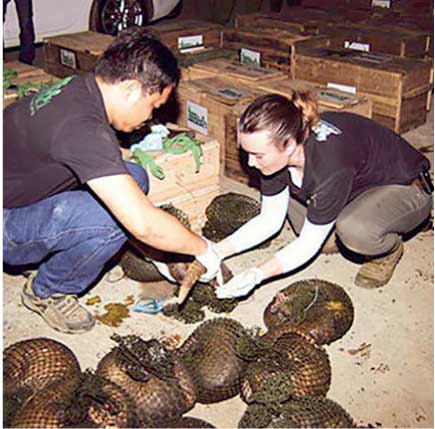
SVW’s awareness programmes have helped to recruit more volunteers, both locals and foreigners. Photo credit: SVW.
When the story was first published on Our Better World, the Singapore International Foundation’s digital storytelling portal, it garnered over 14,000 reactions on social media, with more than 600 readers resharing the post. Many took to SVW’s website, where they directly petitioned the Vietnamese government to ban the trade on pangolins.
In June 2020, the Chinese government banned the use of pangolin scales in traditional medicine. A month later, the Vietnamese government, too, passed the ban on wildlife trade. While the laws have helped curb illegal trade activities in the country, traffickers have found other avenues to transport pangolins in smaller quantities and under the radar. “Our work is nowhere near over,” concludes Thai. “With stricter laws, more cross-border co-operation to stop transnational trafficking, as well greater awareness, there can be a safer world for these scaly anteaters.”
WILDLIFE WARRIORS
These NGOs around the world are dedicated to the protection and wellbeing of pangolins and other wildlife.
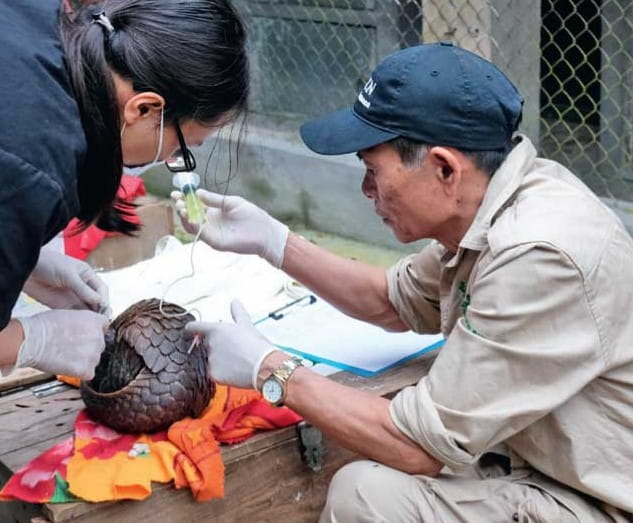
TRAFFIC, an international NGO based in the UK, fights illegal trade of wildlife and plants. In March 2019, it assisted with a seizing operation led by the World Customs Organization, which resulted in 125 arrests and 267 seizures, including almost four tonnes of ivory, 783 pangolins (and an additional 866 kilogrammes of scales and parts), 4,819 turtles and tortoises, 296 pythons, 43 kilogrammes of rhino horn and 113 live parrots.
Pangolin Africa is an NGO dedicated to the conservation of the African pangolin, the most highly trafficked species on the continent. In 2019, it released a ground-breaking 45-minute documentary titled Eye of the Pangolin, which premiered on World Endangered Species Day (May 17) and reached an audience of 10 million viewers via social media.
Save Pangolins is an NGO that supports conservation actions in Africa and Asia, and promotes awareness of pangolins around the world. It lends technical support, together with the Leonardo DiCaprio Foundation, to the Wildlife Conservation Network’s Pangolin Crisis Fund, which aims to deploy US$1.5 million by the end of 2021 for conservation efforts.

Scan the QR code or visit
www. ourbetterworld.org/series/a-wild-life/story/ant-man-en-armoured-his-beloved-pangolin
to find out more.
